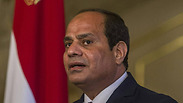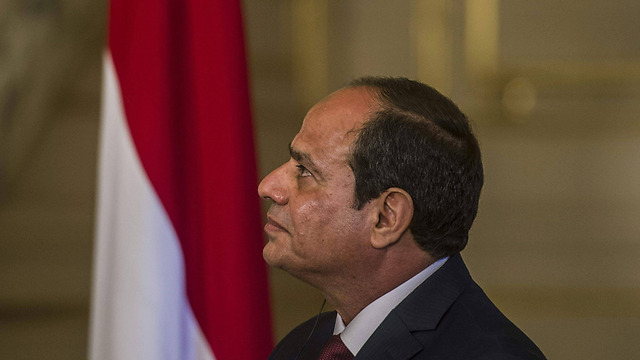
A step in the right direction
Op-ed: Egyptian President Abdel Fattah el-Sisi's Israeli-Palestinian peace initiative may be sincere, but it will be far from easy; as a former head of military intelligence, he's well-versed in Israeli internal politics.
Amid the sea of crises currently threatening our neighborhood, a fascinating list of objectives to a peace initiative was set forth on Tuesday by Egyptian President Abdel Fattah el-Sisi.
Like then-president Anwar Sadat speaking in front of the Egyptian Parliament, Sisi’s move comes as a surprise. However (just like Defense Minister Moshe Dayan’s secret talks with Sadat’s emissary, Deputy Prime Minister Hassan Tuhami. in Morocco), Sisi’s speech was preceded by a series of covert coordination efforts between Jerusalem, Aman and the Saudi Arabian capital of Riyadh. The speedy responses issued by Prime Minister Benjamin Netanyahu and Opposition Leader Isaac Herzog reveal this much: They didn’t fall off their chairs when they heard Sisi talking about “a real opportunity to find a long-awaited solution.” This is because this opportunity is partially based on Egypt’s status as a non-permanent member of the UN Security Council.
The former Egyptian director of military intelligence, Sisi knows a thing or two about the political camps in Israeli politics, which is why he needs a unity government to be established here: He knows that without Herzog as minister of foreign affairs, Netanyahu won’t have any wiggle room. If the move pans out, leave it to Netanyahu to take all the credit. And if it fails, it’ll be Herzog who will take the heat.
Sisi is very familiar with the advantages of having the military, security and intelligence branches work in tandem, and he is well-aware of the animosity the Egyptian public has for the country’s academics, intellectuals, parliament members and professional unions. Members of this elite group balk at any attempt at a “normalization” or cooperation with “the Zionist enemy.” This was why he chose to deliver his speech from the remote South Egyptian village of Asyut, and as part of a joyous occasion—the opening of a new electricity plant due to service millions—thereby first offering his message to his own people first. He has already gone farther with Netanyahu, the Saudi Arabian royal family, King Abdullah II of Jordan and for all we know perhaps even with Abu Mazen (Mahmoud Abbas). Look at what he’s offering here: to give Palestinians hope (for their own country), while providing Israel security guarantees.
Sisi deals with countless problems, yet those who meet him describe a determined, hardworking and dedicated leader who can tell his supporters apart from those working to undermine him. Israel is definitely seen as one of the good guys, as Sisi has willingly disclosed his frequent phone conversations with Netanyahu.
The task Sisi has taken on is far from simple. On the one hand, he has promised not to force any solutions, and on the other hand he cannot afford to fail. His plan is comprised of stages: first, political unity needs to be reached in Israel and for the Palestinians. Once this is achieved, the negotiation stage can begin. This is where problems from the Oslo Accords await: where to draw border lines, what to do with the settlements, the division of Jerusalem and the right of return, an issue that has the potential to take down both the Palestinian government and our own. There are no shortcuts, and without painful compromises on both sides as well as (Saudi) incentives, Sisi knows he’ll never reach his end goal.











